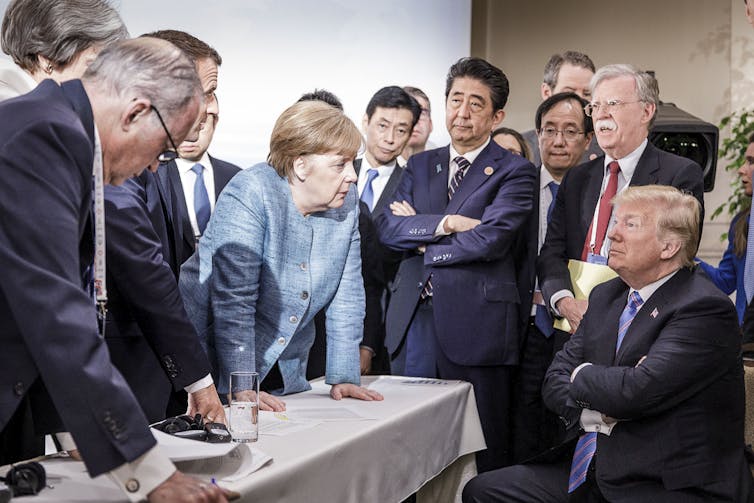Less than 24 hours after Donald Trump was elected president of the United States in November 2024, Germany's state-owned news agency Deutsche Welle published an article titled "Trump's election victory is a nightmare for Germany."
Hours later, German Chancellor Olaf Scholz announced that his three-party political alliance had collapsed. Disagreement over how to help strengthen Germany's ailing economy was a major factor, but Scholz mentioned that the U.S. election results also exacerbated the breakdown in the alliance.
A month later, Scholz lost a confidence vote, ending the government he had led since 2021. Germany will hold federal elections on February 23, 2025.
Germany is considered one of the United States' closest allies in Western Europe, cooperating in various fields from economics and trade to military defense.
But that could change as Trump returns to office. As Angela Merkel, the long-time former German chancellor, said in November 2024, the impending second term of Trump’s presidency “is a challenge to the world, especially to multilateralism.” . In fact, Trump’s U.S.-centric approach to international affairs runs counter to multilateralism, the idea that different countries work together to help all participants.
As someone who studies German-American relations in the 20th century, I share the concerns of German politicians that the incoming Trump administration will pose a serious threat to German-American relations.
Concerns in Germany include the potential for Trump to launch a trade war triggered by tariffs and the potential for the president-elect to withdraw financial and military support for Ukraine's war with Russia. Both scenarios would further damage the ailing German economy - especially since Germany is Ukraine's third-largest donor after the United States and the European Union and would need to shoulder more financial support if the United States stopped providing funds to Ukraine.
Even though Trump has become president, German politicians are still surprised by Trump's unique political style.
Merkel wrote in her 2024 memoir "Freedom: A Memoir 1954-2021" that when she first met Trump in 2017, she acted as if she was talking to "a completely normal man." However, Merkel quickly realized that Trump was different from other American politicians. She observed that Trump seemed to believe that all countries were in competition and that one country's success meant another's failure.

lasting alliance
This is not the type that U.S. President Angela Merkel and other Germans are used to. Merkel was born in 1954, when Germany was divided into two countries: communist East Germany, where Merkel grew up, and Soviet-aligned East Germany, and capitalist West Germany, made up of France, the United States, and three western regions controlled by the United States Kingdom at the end of World War II and allied with the United States
In the immediate aftermath of the war, the United States viewed West Germany as an important ally. This alliance helped the United States ensure that Germany, until recently an enemy of the United States during World War II, would never again become a threat to world peace.
West Germany was also a key front in Europe when the Cold War between the United States and the Soviet Union began in 1947.
At the same time, West Germany recognized the power of having an American superpartner during the Cold War, especially since West Germany prospered economically during much of the conflict. East Germany's economy, on the other hand, was relatively weak throughout the Cold War.
Perhaps the most visible symbol of Germany's division is the Berlin Wall, a 96-mile-long separation wall that spans Berlin. East German authorities built the wall in 1961 to prevent East Germans from fleeing to West Germany.
Merkel did not enter politics until the fall of the Berlin Wall in November 1989, marking the end of the Cold War and opening up the possibility of German reunification.
united germany and united states
As a politician in the 1990s, Merkel witnessed how then-President George H.W. Bush persuaded France and Britain to put aside their fears of Germany's new dominance of Europe and allow their World War II foes to unify and gain Complete sovereignty.
Europe's four main allies during World War II - Britain, the United States, the Soviet Union and France - initially denied German sovereignty after the war ended.
But in 1990, the four Allies signed the Two Plus Four Pact - an international agreement that allowed Germany to unify as a fully sovereign state in October 1990.
Bush then praised the transatlantic alliance between the United States and Germany. The US president stressed the two countries' shared "love of freedom" and expressed his hope that the two countries would become "leading partners".
Bush's words marked an important shift in the international community's expectations of Germany and the need for Germany to become a more influential political and military player in world politics. However, many Germans do not necessarily welcome this shift. The Germans were unwilling to assume the strong leadership role expected by the United States.
At the time, Germans generally believed that military restraint had finally made their country a stable and prosperous country after two devastating wars.
Indeed, in almost every global crisis since 1990—from the 1992 Bosnian war to Russia's 2014 annexation of Crimea—Germany has shown a reluctance to take the lead. Instead, Germany prefers to play a minor role in international conflicts, primarily through its membership in NATO and the United Nations military alliance.

Germany's current international status
After Russia launched a full-scale invasion of Ukraine in February 2022, Germany's approach to international conflicts changed dramatically, finally stepping into the leadership role envisioned by Bush in 1990. In a historic speech on February 27, 2022, Scholz called the attack "Zeitenwende," which means "watershed era" in German, and announced a significant increase in military spending.
The United States and other Western allies welcomed the shift.
Although NATO members agreed in 2006 to invest at least 2% of their gross domestic product in defense spending, Germany, like other European countries, has not fulfilled this pledge for years.
It was not until February 2024, as Russia's war in Ukraine continued, that Germany finally achieved its 2% spending target for the first time.
It did so not just as a result of that conflict.
Pressure from US presidents, especially Trump, also played a significant role. Trump’s constant threats during his first term to “pay your bills or we’ll leave NATO” have clearly paid off.
It is the responsibility of the new German government to remind Trump of the history of German-American relations and the many benefits of the two countries' transatlantic alliance since 1945.